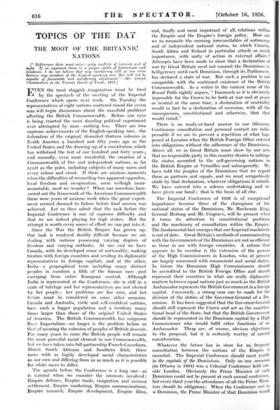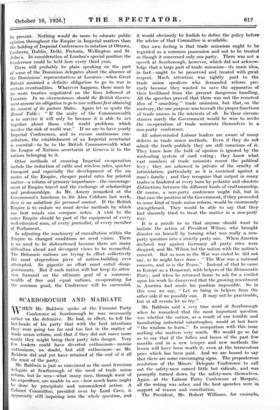TOPICS OF THE DAY
THE MOOT OF THE BRITANNIC NATIONS
[" Differences there must arise—petty conflicts of interests and of right. If we approach them. in a proper spirit of forbearance and kindness, I do not believe that any controversy will or can arise between any members of the English-speaking race that will not be capable of JavOurrzble and satisfactory adjustment."—Mr. Joseph Chamberlain at the Toronto Board of Trade, 1887.1 FVEN the most sluggish imagination must be fired by the spectacle of the meeting of the Imperial Conference which opens next week. On Tuesday the representatives of eight nations scattered round the seven seas will begin discussions about the manifold problems affecting the British Commonwealth. Before our eyes is being enacted the most dazzling political experiment ever attempted by man—nothing less. There are two supreme achievements of the English-speaking race—the federation of the original, disunited thirteen colonies in North America a hundred and fifty years ago as the United States and the drawing up of a constitution which has withstood the test of one hundred and forty years ; and secondly, even more wonderful, the creation of a Commonwealth of free and independent nations, as far apart as the poles, including subjects of many races and every colour and creed. If there are anxious moments w hen the difficulties of reconciling two apparent opposites, local freedom and co-operation, seem weilnigh insur- mountable, need we wonder ? When our ancestors ham- mered out the framework of the American Commonwealth there were years of anxious work when the great experi- ment seemed doomed to failure before final success was achieved. Let us then admit that the task before the Imperial Conference is one of supreme difficulty and that we are indeed playing for high stakes. But the attempt is worth every ounce of effort we can put into it.
Since the War the British Empire has grown up: Our task is rendered doubly difficult because we are dealing with nations possessing varying degrees of freedom and varying outlooks. At one end we have Canada, with its developed sense of nationality, making treaties with foreign countries and sending its diplomatic representatives to foreign capitals, and at the other, India—a geographical term including many distinct peoples in numbers a fifth of the human race—just emerging from entire European control. Although India is represented at the Conference, she - is . still • in a• state of tutelage and her representatives are not .elected by her people ; her problems are her own, and her. future must be considered on some other occasion. Canada and Australia, virile and self-confident nations,. have each a bigger population and a territory many. times larger than those of the original United States- of America. The British Commonwealth has outgrown' Race Imperialism—no longer is the problem before us that of securing the cohesion of peoples of British descent. For many years to come the British people will remain the most powerful racial element in our Commonwealth, but we have taken into full partnership French-Canadians, Dutch South Africans and Southern Irish, • three races with as highly developed racial characteristics as our own and differing from us as much as it is possible for white races to differ. • The agenda before the Conference is 'a long oneas, is natural when we consider the interests involved :. Empire defence, Empire trade, emigration and oversea settlement, Empire marketing, Empire communications, Empire research, Empire development, Empire films, and, finally and most important of all, relations within the Empire and the Empire's foreign policy. How are we to reconcile the seeming irreconcilables of autonomy and of independent' national status, to which Canada, South Africa and Ireland in particular attach so much importance, with unity of action in external affairs ? Attempts have been made to show that a declaration of war by Great Britain need not commit the Dominions to belligerency until each Dominion, through its Parliament, has 'declared a state of war. -But such a position is not compatible with the' continued- existence of the' British Commonwealth. As a writer in the current issue of the Round Table rightly argues, " Inasmuch as it is obviously impossible for the Crown to be both at war and at peace or neutral at the same time, a declaration of neutrality would in fact be a declaration of secession, with all the consequences, constitutional and otherwise, that that would entail."
There is no ready-at-hand answer to our dilemma. Continuous consultation and personal contact are indis- pensable if we are to prevent a .repetition of- what hap- pened at Locarno when the British Foreign Office entered into obligations without the adherence of the Dominions. Above all, we in Great Britain must show by our acts that no responsible party in this country desires to infringe the status accorded to the self-gOverning nations in the British Empire at Versailles and subsequently. We have told the peoples of the DoMiniOns that we regard them as partners and equals, and we must scrupulously abide by that declaration, whatever obligations it entails. We have entered into a solemn undertaking and we have given our bond ; that is the basis of all else.
The Imperial Conference of 1926 is of exceptional importance because three of the champions of the national status of the Dominions, Mr. Mackenzie King, General Hertzog and Mr. Cosgrave, will be present when it turns its attention to constitutional problems and the machinery of consultation within the Empire. The fundamental fact emerges that our Imperial machinery is out of date. Great Britain's methods of communicating with the Governments of the Dominions are not as efficient as those in use with foreign countries. A reform that appears to be overdue is the extension of the powers of the High Commissioners in London, who. at present are largely concerned with commercial and social duties. In future the Dominion High Commissioners should be accredited to the British Foreign Office and should represent their countries in what are really diplomatic matters between equal nations just as much as the British Ambassador represents the British Government in a foreign capital. Conversely, a strong case can be made for the division of the duties of the Governor-General of a Do- minion. It has been suggested that the Governor,General should still represent the Crown and act as the constitu- tional head of the State,-but that the British Goirernment should be representedin the Dominion capital by a High Commissioner who ' would fulfil other . functions of an Ambassador. There are, of course, obvious objections to the proposal, but it -is certainly- worthy of careful consideration.
. Whatever the future has in store for us,. frequent consultation between the nations of the Empire is essential.- The Imperial Conference should Meet yearly in- the capitals of the DOritinimis. Only on 'one occasion On -Ottawa in 1894) was a Colonial Conference held out- side London. Obviously the Prime Minister of each Dominion. could .not be.present at each annual conference. but every third year the attendance of all the Prime Minis- ters should be obligatory. When the Conference met in a Dominion, the Prime Minister of that Dominion would . be present. Nothing would do more to educate public opinion throughout the Empire in-Imperial matters than the holding of Imperial Conferences in rotation at Ottawa, Canberra, Dublin, Delhi, Pretoria, Wellington and St. John's. In consideration of London's special position the Conference could be held here every third year. There will probably be plain speaking on the part of some of the Dominion delegates about the absence of the Dominions' representatives at Locarno—when Great Britain assumed a definite obligation to go to war in certain eventualities. Whatever happens, there must be no more treaties negotiated on the lines followed at Locarno. In no circumstances should the British Govern- ment assume an obligation to go to war without first obtaining the consent of its partner States. Again let us quote the Round Table : " If the unity of the Commonwealth is to survive it will only be because it is able to act together about those vital world problems which involve the risk of world war." If we are to have yearly Imperial Conferences, and to ensure continuous con- sultation, the establishment of an Imperial secretariat is essential—to be to the British Commonwealth what the League of Nations secretariat at Geneva is to the nations belonging to it.
Other methods of ensuring Imperial co-operation include the reduction of cable and wireless rates, quicker transport and especially the development of the air routes of the Empire, cheaper postal rates for printed matter—a reform of primary importance—the encourage- ment of Empire travel and the exchange of scholarships and professorships. As Mr. Amery remarked at the Government's luncheon to Sir Alan Cobham last week, there is no substitute for personal contact. If the British Empire is to endure we must devise methods by which our best minds can compare notes. -A visit to the• outer Empire should be part of the equipment of every well-educated man, of every journalist, of every member of Parliament.
In ndjusting the machinery of consultation within the Empire to changed conditions' we need vision. There is no need to be disheartened because there are many difficulties ahead and divergent views to be reconciled. The Britannic nations are trying to effect collectively the most stupendous piece of nation-building ever attempted. So gigantic an effort must entail disap- pointments. But if each nation will but keep its atten tion focussed on the .ultimate goal of a common- wealth of free and equal nations, co-operating for the common good, the Conference will be successful.























































 Previous page
Previous page